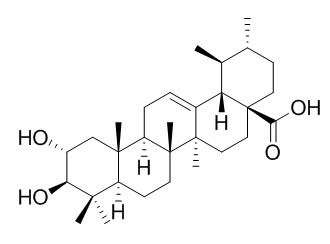Natural Products
Corosolic acid
| Catalog No. | CFN98685 |  |
| CAS No. | 4547-24-4 | |
| Molecular Weight: | 472.7 | |
| Molecular Formula | C30H48O4 | |
| DBs | [PubChem]:274951818 [ChEMBL]:67895 [PCIDB]:31690 |
Standard InChI:
InChI=1S/C30H48O4/c1-17-10-13-30(25(33)34)15-14-28(6)19(23(30)18(17)2)8-9-22-27(5)16-20(31)24(32)26(3,4)21(27)11-12-29(22,28)7/h8,17-18,20-24,31-32H,9-16H2,1-7H3,(H,33,34)/t17-,18+,20-,21+,22-,23+,24+,27+,28-,29-,30+/m1/s1
Biological Activity
Corosolic acid (CRA), a constituent of banaba leaves, has been reported to have anti-inflammatory and hypoglycemic activities, it can ameliorate hypertension, abnormal lipid metabolism, and oxidative stress as well as the inflammatory state in SHR-cp rats, suggests CRA can be beneficial for preventing atherosclerosis-related diseases.[1]
Corosolic acid significantly inhibits cell viability in both a dose- and a time-dependent manner, induces apoptosis is associated with the activation of caspases via a mitochondrial pathway, suggests it could have strong potentials for clinical application in treating human cervix adenocarcinoma and improving cancer chemotherapy.[2]
Corosolic acid can suppress the M2 polarization of macrophages and tumor cell proliferation by inhibiting both STAT3 and NF-κB activation, thus, it might be a potential new tool for tumor prevention and therapy.[3]
Corosolic acid has antidiabetic effects(especially type 2 diabetes), can improve glucose metabolism by reducing insulin resistance, it inhibits the enzymatic activities of several diabetes-related non-receptor protein tyrosine phosphatases (PTPs) in vitro, such as PTP1B, T-cell-PTP, src homology phosphatase-1 and src homology phosphatase-2.[4,5]
Corosolic acid has antitumor effects in murine sarcoma model through significantly impairing subcutaneous tumor development and lung metastasis and targeting the immunosuppressive activity of myeloid-derived suppressor cells (MDSC), and can enhance the antitumor effects of adriamycin and cisplatin in in vitro.[6]
Product
References
[1] Yu Y, Yamada K, Yoshikawa N, et al. Life Sci, 2006, 79(26):2474-9.
[2] Xu Y, Ge R, Du J, et al. Cancer Lett, 2009, 284(2):229237.
[3] Fujiwara Y, Komohara Y, Ikeda T, et al. Cancer Sci, 2011, 102(1):206-11.
[4] Miura T, Ueda N, Yamada K, et al. Biolo Pharmal Bull, 2006, 29(3):585-7.
[5] Shi L, Zhang W, Zhou Y Y, et al. Eur J Pharmacol, 2008, 584(1):21-9.
[6] Hasita Horlad †, Yukio Fujiwara †, Takemura K, et al. Mol Nutr Food Res, 2013, 57(6):1046–54.
[7] Liu B, Yang Y F, He-Zhen W U. Chinese Journal of Pharmaceutical Analysis, 2011, 31(12):2217-9.
Product Use Citation





